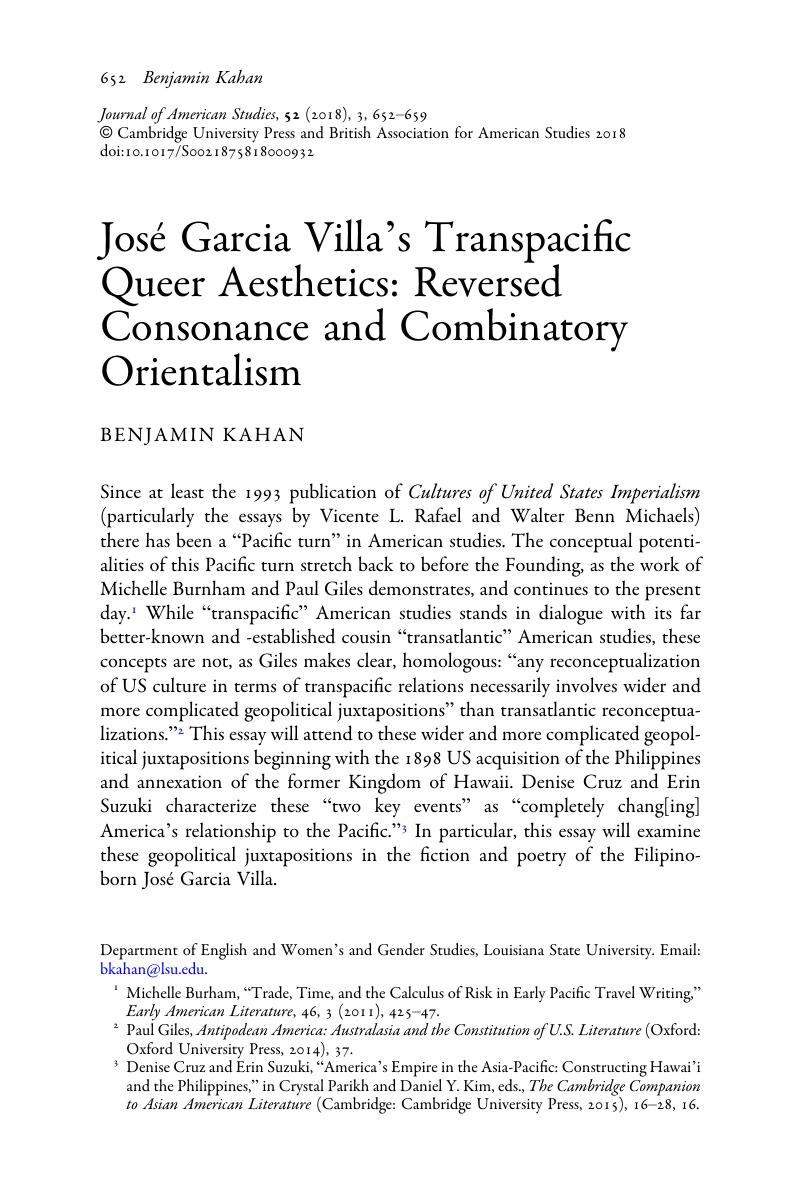No CrossRef data available.
Published online by Cambridge University Press: 03 August 2018

1 Burham, Michelle, “Trade, Time, and the Calculus of Risk in Early Pacific Travel Writing,” Early American Literature, 46, 3 (2011), 425–47CrossRefGoogle Scholar.
2 Giles, Paul, Antipodean America: Australasia and the Constitution of U.S. Literature (Oxford: Oxford University Press, 2014), 37CrossRefGoogle Scholar.
3 Cruz, Denise and Suzuki, Erin, “America's Empire in the Asia-Pacific: Constructing Hawai'i and the Philippines,” in Parikh, Crystal and Kim, Daniel Y., eds., The Cambridge Companion to Asian American Literature (Cambridge: Cambridge University Press, 2015), 16–28CrossRefGoogle Scholar, 16.
4 Quoted in Ponce, Martin Joseph, “José Garcia Villa's Modernism and the Politics of Queer Diasporic Reading,” GLQ, 17, 4 (2011), 575–602CrossRefGoogle Scholar, 575. Ponce provides an excellent and detailed account of these events.
5 Ibid., 575.
6 Villa seems to contradict this well-documented story of his own life in a poetry reading in 1958, creating a different narrative of transpacific queer crossing. The man introducing Villa says that he “was born in the Philippines and came to this country [America] at the age of 14. He went to high school in Albuquerque, New Mexico. And there they made a terrible mistake … they threw him out of high school for publishing a poem which they said was obscene. He was not able to finish high school, but he went to the University of New Mexico.” Villa corroborates this story, saying, “I will first read you the poem that I was thrown out of high school for” before reading “Song of Ripeness” [“The Coconut Poem”] from “Man-Songs” and saying that he wrote it was he was “seventeen years old.” José Garcia Villa, “Poems of José Garcia Villa,” Buffalo Courier- Express Station Broadcasting House, Buffalo, NY, 1958, University at Buffalo Special Collections, Record V54.42J 1958 P64 1.1 Disc 1.
7 Yu, Timothy, “Transnationalism and Diaspora in American Poetry,” in Nelson, Cary, ed., The Oxford Handbook of Modern and Contemporary American Poetry (Oxford: Oxford University Press, 2012), 624–37Google Scholar, 629.
8 Ponce, 593, Ponce, Martin Joseph, Beyond the Nation: Diasporic Filipino Literature and Queer Reading (New York: New York University Press, 2012), 88CrossRefGoogle Scholar.
9 Cruz, Denise, “José Garcia Villa's Collection of ‘Others’: Irreconcilablities of a Queer Transpacific Modernism,” Modern Fiction Studies, 55, 1 (2009), 11–4CrossRefGoogle Scholar1, 13–14.
10 Ibid., 14. See also Cruz, Denise, “Transpacific Modernisms,” in Miller, Joshua L., ed., The Cambridge Companion to the American Modernist Novel (Cambridge: Cambridge University Press, 2015), 36–51Google Scholar.
11 Villa, José Garcia, Footnote to Youth: Tales of the Philippines and Others (New York: Charles Scribner's Son's, 1933), 303, 302Google Scholar.
12 Ibid., 302–3.
13 Ponce, Beyond the Nation, 71.
14 Villa, 301.
15 Villa, 303–4.
16 Yu, Timothy, “‘The Hand of a Chinese Master’: José Garcia Villa and Modernist Orientalism,” Melus, 29, 1 (2004), 41–59CrossRefGoogle Scholar, 55.
17 Villa, José Garcia, Doveglion: Collected Poems, ed. Cowen, John Edwin (New York: Penguin Books, 2008), 74Google Scholar.
18 Moore, Marianne, “Who Seeks Shall Find,” in Willis, Patricia C., ed., The Complete Prose of Marianne Moore (New York: Viking, 1986), 369–72Google Scholar, 371.
19 Auden, W. H., Collected Poems, ed. Mendelson, Edward (New York: Vintage, 1991), 86Google Scholar.
20 Villa, Doveglion, 74.
21 Ibid., 74.
22 Lye, Colleen, America's Asia: Racial Form and American Literature, 1893–1945 (Princeton, NJ: Princeton University Press, 2005), 15Google Scholar. On Sitwell's racial politics see Bryant, Marsha, “Sitwell beyond the Semiotic: Gender, Race, and Empire in Façade,” Tulsa Studies in Women's Literature, 26, 2 (2007), 243–67Google Scholar.
23 Quoted in Samberger, Sonja, Artistic Outlaws: The Modernist Poetics of Edith Sitwell, Amy Lowell, Gertrude Stein and H.D., Volume IV (London: LIT Verlag), 55Google Scholar.